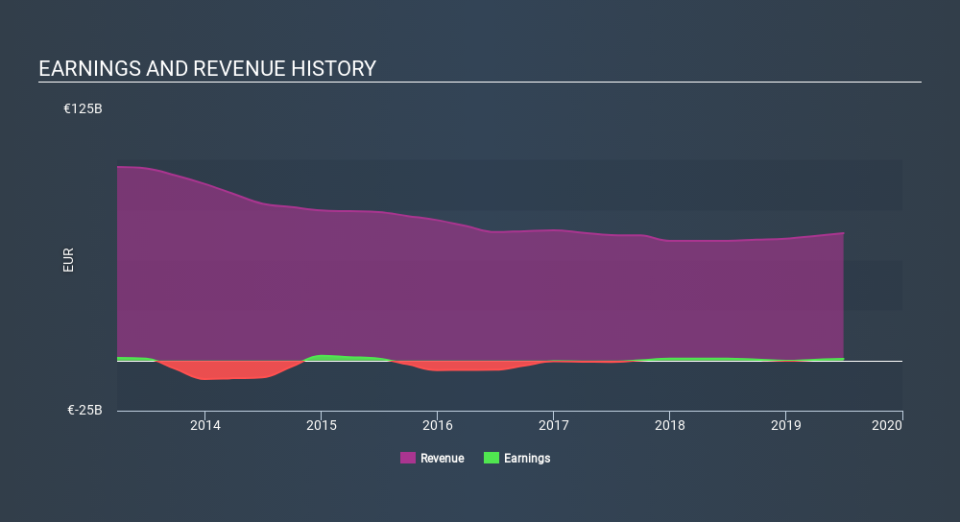Those Who Purchased ENGIE (EPA:ENGI) Shares Five Years Ago Have A 21% Loss To Show For It

In order to justify the effort of selecting individual stocks, it's worth striving to beat the returns from a market index fund. But in any portfolio, there will be mixed results between individual stocks. So we wouldn't blame long term ENGIE SA (EPA:ENGI) shareholders for doubting their decision to hold, with the stock down 21% over a half decade. It's down 1.5% in the last seven days.
See our latest analysis for ENGIE
To paraphrase Benjamin Graham: Over the short term the market is a voting machine, but over the long term it's a weighing machine. One flawed but reasonable way to assess how sentiment around a company has changed is to compare the earnings per share (EPS) with the share price.
ENGIE became profitable within the last five years. That would generally be considered a positive, so we are surprised to see the share price is down. Other metrics might give us a better handle on how its value is changing over time.
The most recent dividend was actually lower than it was in the past, so that may have sent the share price lower. On top of that, revenue has declined by 5.4% per year over the half decade; that could be a red flag for some investors.
The company's revenue and earnings (over time) are depicted in the image below (click to see the exact numbers).
ENGIE is well known by investors, and plenty of clever analysts have tried to predict the future profit levels. So we recommend checking out this free report showing consensus forecasts
What About Dividends?
As well as measuring the share price return, investors should also consider the total shareholder return (TSR). The TSR incorporates the value of any spin-offs or discounted capital raisings, along with any dividends, based on the assumption that the dividends are reinvested. It's fair to say that the TSR gives a more complete picture for stocks that pay a dividend. In the case of ENGIE, it has a TSR of 7.0% for the last 5 years. That exceeds its share price return that we previously mentioned. This is largely a result of its dividend payments!
A Different Perspective
ENGIE shareholders gained a total return of 22% during the year. Unfortunately this falls short of the market return. The silver lining is that the gain was actually better than the average annual return of 1.4% per year over five year. It is possible that returns will improve along with the business fundamentals. Importantly, we haven't analysed ENGIE's dividend history. This free visual report on its dividends is a must-read if you're thinking of buying.
But note: ENGIE may not be the best stock to buy. So take a peek at this free list of interesting companies with past earnings growth (and further growth forecast).
Please note, the market returns quoted in this article reflect the market weighted average returns of stocks that currently trade on FR exchanges.
If you spot an error that warrants correction, please contact the editor at editorial-team@simplywallst.com. This article by Simply Wall St is general in nature. It does not constitute a recommendation to buy or sell any stock, and does not take account of your objectives, or your financial situation. Simply Wall St has no position in the stocks mentioned.
We aim to bring you long-term focused research analysis driven by fundamental data. Note that our analysis may not factor in the latest price-sensitive company announcements or qualitative material. Thank you for reading.

 Yahoo Finance
Yahoo Finance 
